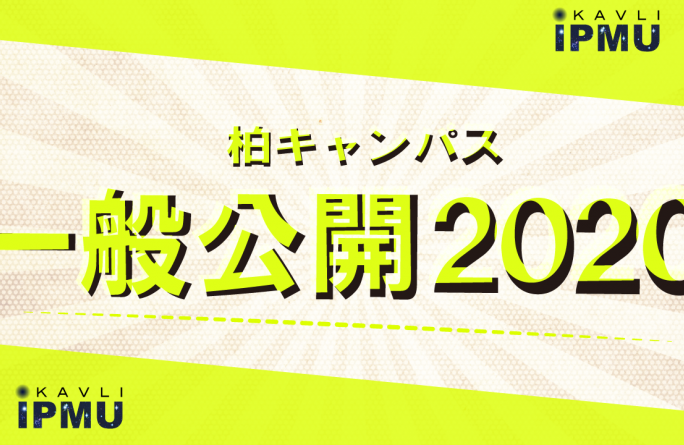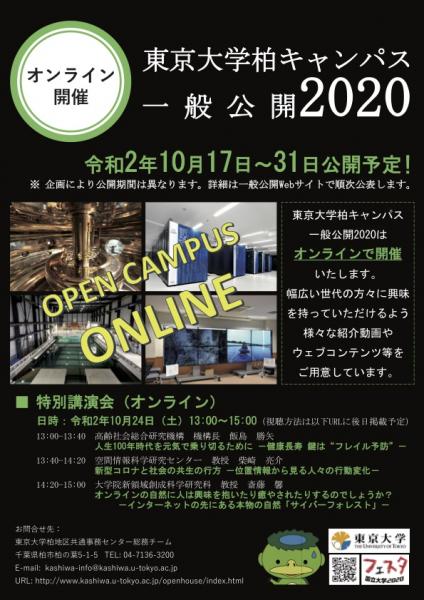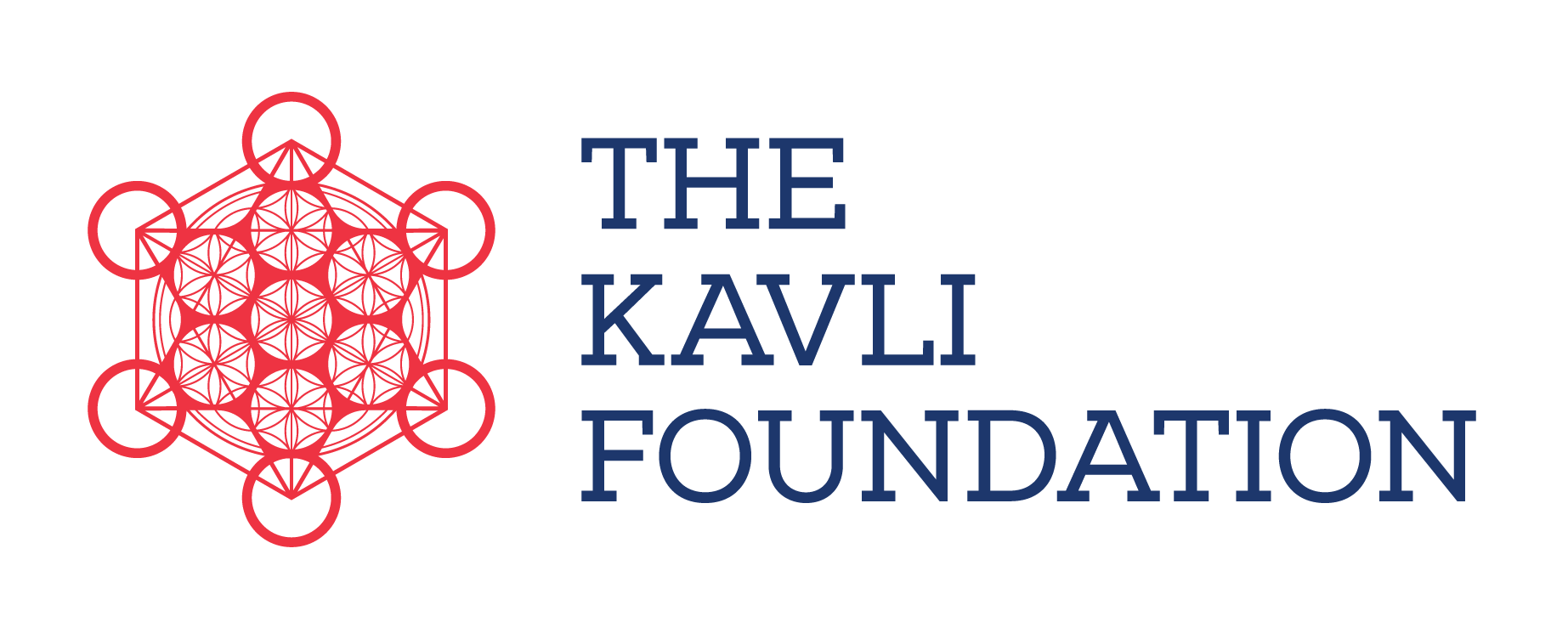
OVERVIEW
 The University of Tokyo’s Kashiwa campus will open to the public online for two weeks from October 17 (Sat.), 2020. Thirteen departments, including graduate schools and research institutes, will participate. Dates and times will vary depending on the department/institute.
The University of Tokyo’s Kashiwa campus will open to the public online for two weeks from October 17 (Sat.), 2020. Thirteen departments, including graduate schools and research institutes, will participate. Dates and times will vary depending on the department/institute.
SUMMARY
Date: October 17 (Sat.) to 31 (Sat.), 2020
Location: Online (livestream, recorded video, Q&A via Zoom and online bulletin boards, online exhibitions and more)
Information: University of Tokyo’s Kashiwa campus 2020 and institutional home pages (Japanese)
*Events at Kavli IPMU: October 18 and 25
*No application required. Events archived and accessible until the end of October
OCTOBER 18 (Sunday)
10:30 - 11:30
Kavli IPMU: Ask Me Anything Corner
(Target: Junior high school students+)
Misao Sasaki, deputy director, Kavli IPMU, a specialist in theoretical physics (cosmology), will answer your questions about the universe and research at Kavli IPMU. (This talk will be in Japanese only)
* Support: This talk will introduce and latest work from Transformative Research Areas Project 20H05850: "What is dark matter? - Comprehensive study of the huge discovery space in dark matter"
13:00 - 14:30
I want to learn more about the XENON Experiment!
(Target: Junior high school students+)
The international experimental group XENON collaboration announced a major result in June 2020. Kai Martens, the Japan representative of the XENON Experiment, and a principal investigator and associate professor at the Kavli IPMU, together with Shigetaka Moriyama, a principal investigator at the Kavli IPMU, will speak in a webinar co-hosted with the Institute for Cosmic Ray Research (ICRR). (This talk will be in Japanese and partly in English)
Lecture 1
XENON underground: How to build a serendipity machine
(Kai Martens, Kamioka branch director, and principal investigator, Kavli IPMU)
Doing scientific research means reaching beyond the territory that knowledge has charted already. Doing that scientifically means to not do it blindly though, but to follow leads that are informed by existing knowledge. The search for dark matter particles is such a scientific endeavor. In this first of our two lectures, Martens will explain why scientists believe that dark matter exists, and how they designed the experiment—the serendipity machine—to find it. The machine will expand not only our knowledge about what dark matter may or may not be, but also offer serendipity ample opportunity to surprise us with new insights.
Lecture 2
XENONnT: Physics and this next generation serendipity machine
(Shigetaka Moriyama, professor, Institute for Cosmic Ray Research, and principal investigator, Kavli IPMU)
In this lecture, we will talk about the XENON1T Experiment—which has been searching for dark matter—and its results, including the participation of the Japanese group. We will also discuss the up-coming XENONnT Experiment, which has significantly improved the sensitivity of the experiment. As we will hear, these experiments aim to study dark matter and identify elementary particles—the XENON1T experiment, for example, may have captured a solar axion signal.
15:00 - 16:00
Bookmark making!
(Target: Elementary school students+)
Create your own bookmarks using images of space from Kavli IPMU. (This session will be in Japanese and English)
OCTOBER 25 (Sunday)
10:30 - 11:30
What happened at the beginning of the universe: the Big Bang and it’s afterglow, the Cosmic Microwave Background
(Target: Junior high school students+)
Kavli IPMU Principal Investigator and Professor at the Graduate School of Science, Nagoya University, Naoshi Sugiyama, will give the lecture. (This talk will be in Japanese only)
12:00 - 12:30
Try it out: Mathematical puzzles—fill in the spaces with shapes
(Target: Elementary school students+)
Create your own math puzzles at home. The lecture part will be provided by Kavli IPMU Principal Investigator and Professor at Meiji University, Toshitake Kono. Please download the abstract in English here.
12:00 - 12:15
Puzzle-making (The puzzle-making part will be in Japanese and English)
12:15 – 12:30
Short Lecture: Kavli IPMU Principal Investigator and Professor at Meiji University, Toshitake Kono. (The lecture will be in Japanese only)
13:00 - 14:00
Science Onsen—mathematics x painting
(Target: High school students+)
Presenters: Atsushi Ikeda, associate professor, Josai University and former Kavli IPMU Project Researcher; Yasuo Nomura, contemporary artist
While “science cafes” begun in England, we will adapt the concept and present a Japanese-style “science onsen”—or “science hot spring.” There, deep concepts are discussed in a relaxed atmosphere, and from the point of view of a mathematician and an artist. (This talk will be in Japanese only)
Yasuo Nomura is a contemporary artist who was resident at Kavli IPMU in 2015. He is currently based in New York. Atsushi Ikeda is an associate professor at Josai University and formerly a Kavli IPMU project researcher in mathematics. They will talk about the intersection between art and math.
OCTOBER 17 to 31
All day, everyday
Kavli IPMU Research Building—360° Tour
(Target: Junior high school students+)
The Kavli IPMU Research Building, which won the 2011 Architectural Society Award and the 2012 BCS Prize, is structured so that researchers can interact with each other regardless of their area of expertise or nationality. Try out our virtual tour, which comes complete with images of the building. (This content will be available in Japanese and English)
Elementary particles quiz
(Target: Junior high school students+)
Let’s solve an elementary particles quiz. Successfully hit the passing score to win a prize. (This content will be available in Japanese and English.)






